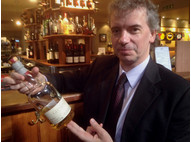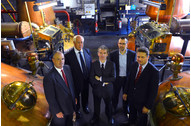
“The beauty is its simplicity,” says Tangney, 47, founder of Celtic Renewables Ltd., an Edinburgh-based company that grew out of his research work as director of the Biofuel Research Centre at Edinburgh Napier University. “Scotch Whisky is synonymous with Scotland, like bagpipes and kilts.”
The professor and his team have developed the technology to produce biobutanol from the by-products of whisky. Tullibardine Ltd., an independent producer in Perthshire, signed an agreement last month with Celtic Renewables aimed at becoming the first distillery in the world to have its waste converted into advanced biofuel, capable of powering vehicles.
Whisky is the country’s biggest export and distillers are expanding production, defying the tough economic climate with sales to emerging markets. At the same time, Scotland is trying to turn itself into a renewable energy hub, with 100 percent of the nation’s electricity needs coming from wind, water and marine sources by 2020 compared with about 35 percent now.

“The brand image of Scotch is absolutely enormous: It’s a global brand people can relate to,” Tangney says in an interview over lunch at The Honours brasserie in the Scottish capital. “At the same time, Scotland has highest self-imposed renewable- energy target in the world.”
Animal Feed
Tullibardine has the capacity to provide 6,500 metric tons of draff (what’s left of the grain after fermentation) and 2 million liters of pot ale (residue from the still), by-products that are currently spread on agricultural fields, turned into animal feed or discharged into the sea, all at cost.
The technology isn’t new, Tangney says. The idea of converting a range of fuels found in plant materials to produce butanol goes back a century, and was scaled up to make acetone for explosives in World War I. The technology died out in the 1960s because of competition from petrochemicals, he says.
The current projections are relatively modest. Celtic Renewables says there is a potential for a 60 million-pound ($97 million) a year industry. By contrast, the Scottish government is targeting 30 billion pounds of investment in the economy and as many as 40,000 jobs related to its renewable-energy plan.
So far, the company has garnered 750,000 pounds of funding. It employs five people, Tangney says.
Export Potential
“I looked at where I could add value on a smaller scale,” he says. “For me, it was the whisky industry. If we can get this right in Scotland, we can adapt it anywhere. India makes whisky, Japan makes whisky, Ireland. And Cognac uses a similar process. A lot of the waste ends up in the sea.”
Tangney says such a new source of fuel might be of particular interest in communities such as Islay, in the Inner Hebrides, where harsh weather conditions can make it difficult and expensive to obtain fuel.
Islay, off Scotland’s west coast, is home to more than half a dozen distilleries, including Bowmore, Lagavulin and Laphroaig, malts known for their peaty smokiness.
He says Celtic Renewables’ main investor is Donald Houston, who owns Adelphi Distillery, while a pilot demonstration project is being funded with the help of a 155,000-pound grant from Zero Waste Scotland, a Scottish government program to help achieve its targets of eliminating waste.
While Tangney is serious about his vision, he’s good company, too: Sharing a glass of wine or two over lunch and then heading to a bar to pose for a picture holding a bottle of Scotch. It’s good to feel that by drinking Scotch, one can help Scotland go a bit more green.





